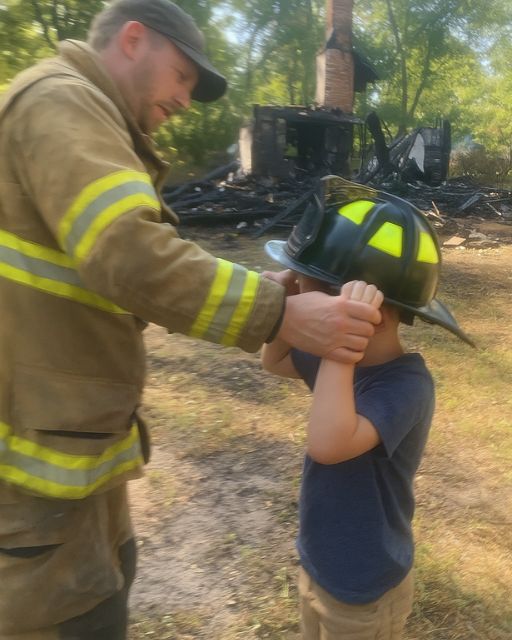The house was still smoking behind us.
You could smell the ash in your hair, feel the heat in your chest even hours later.
What was left of the roof had already caved in.
Nothing but the chimney still standing, like it was waiting for the rest of the family to come home.
But they weren’t.
Just me, the little boy, and the sound of crackling ruins.
He hadn’t said a word since we pulled him from the porch steps.
Not even when the paramedics checked him, not when his stuffed bear was declared too burned to keep.
Just stood there, arms wrapped tight around himself, eyes fixed on what used to be his world.
I crouched down next to him, unsure of what to say.
You get trained for fires, not for heartbreak this size.
“Hey,” I said quietly, unhooking my helmet.
“Wanna try something?”
He looked at me for the first time then—really looked.
Eyes rimmed red, cheeks streaked with soot.
I placed the helmet gently over his head.
It was way too big, slid down past his eyebrows.
But he reached up and held it steady.
“That’s what brave looks like,” I told him.
He whispered something then. Just a few words.
But they hit me harder than any blaze I’d ever walked into.
“Can I keep it?”
I froze for a second. That helmet had my name etched inside. Worn from years of calls, from heat, from the weight of a thousand moments just like this.
But this moment wasn’t mine anymore.
I nodded.
“Yeah, kid. It’s yours now.”
The next morning, I drove by the site before my shift ended.
Ash was still swirling in the air like ghosts not ready to leave.
The little boy—Noah, I later learned—was sitting on the edge of a cot at the temporary shelter a block over, still wearing that helmet.
His aunt told me it hadn’t left his head all night.
She said he finally spoke again.
Said he wanted to be a firefighter one day.
A few weeks passed. Life moved on.
Most calls blur together after a while—car accidents, false alarms, kitchen fires that get out of hand.
But I couldn’t stop thinking about Noah.
The way he stood still in the chaos.
The way his little hands gripped that helmet like it was armor.
So I wrote his name on our whiteboard at the station.
Right under the “Community Visits” list.
A few days later, we invited him to tour the firehouse.
He came with his aunt.
Still a little quiet, but with eyes that didn’t miss a thing.
We let him climb into the truck, turn on the lights, even try on one of the junior gear jackets.
He wouldn’t take off the helmet.
Before he left, I gave him a patch from my uniform. Told him he had to earn the next one by staying brave.
He looked up at me, serious as anything, and said,
“I’m already brave. I just needed someone to tell me.”
The twist?
That helmet—my old one—ended up doing more than helping a boy heal.
It sparked something bigger.
Our station started a new tradition.
Every year, we donate one helmet to a child who’s shown exceptional courage—surviving a tragedy, saving a sibling, standing up in hard times.
We call it “The Noah Award.”
And the first plaque?
It’s hanging right in our lobby.
Helmet and all.
Here’s what I’ve learned:
Sometimes being brave means running into fire.
Sometimes it means standing still while everything burns.
But sometimes, it just means holding on.
Tight.
Even when it feels like the world forgot you.
A helmet, a patch, a quiet moment on a street filled with smoke—
that’s where healing starts.
That’s where heroes begin.
If this story moved you, share it. Like it if you believe the smallest hands can carry the biggest courage. And remember—someone out there might be holding on by a thread. Be the reason they keep going.




